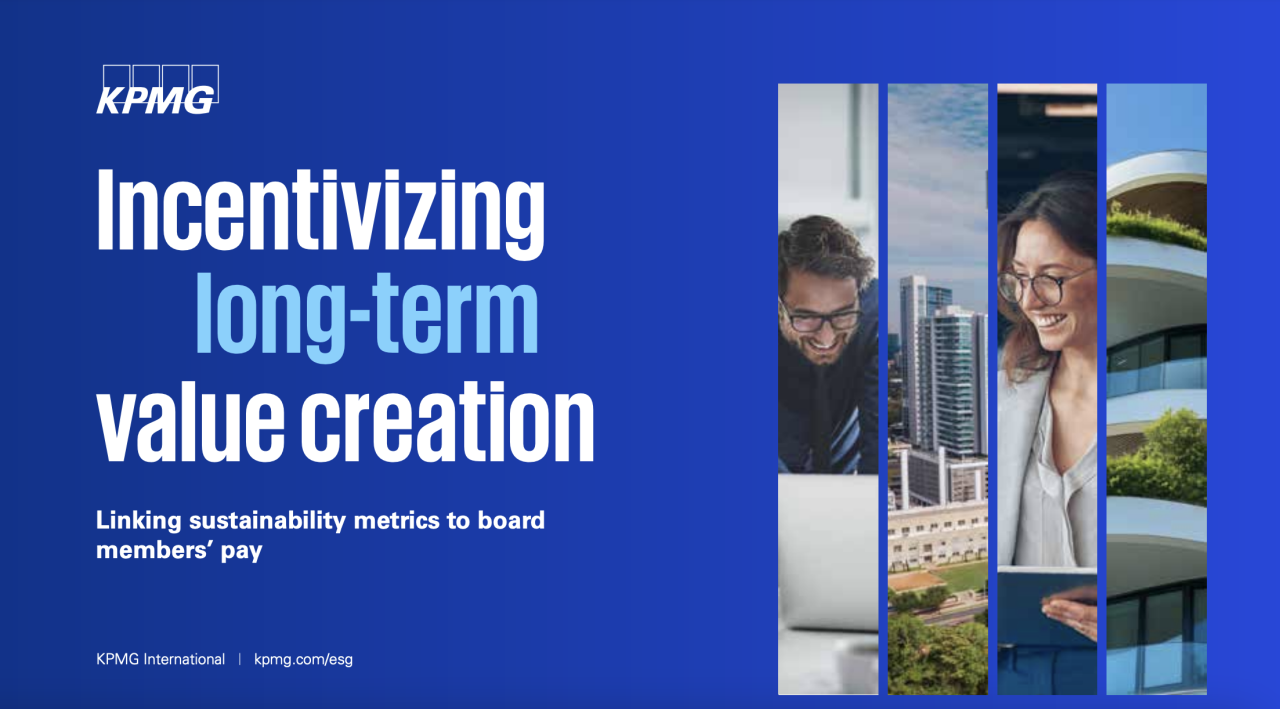Incentivizing Long-Term Value Creation
Linking sustainability metrics to board members’ pay.
Published 04-30-25
Submitted by KPMG

Companies have made significant progress in recent years in identifying the risks and opportunities related to how sustainability is considered in a company’s strategy. However, in many instances, the realization of these opportunities or risks falls outside the normal business planning cycle. Therefore, incentivizing sustainability-minded behavior is a key element of an overall governance model that supports day-to-day decision-making.
A company’s strategic course is set by its management, yet it is these managers who must help ensure that this course is adhered to in their daily decisions. An effective way of providing them with further incentives to stay on course is to anchor the company’s sustainability targets in their remuneration, in the same way as other strategic aims.
Consequently, linking strategic priorities to the key governance setup of a company remains an aspect of utmost importance to stakeholders, particularly investors. Remuneration is one strategic pillar of a robust governance model.
For this reason, the management board pay system is a key aspect of corporate governance for a company’s shareholders. With this overview of 375 companies from 15 countries, we take stock of the integration of sustainability criteria into board members’ pay, finding that an impressive 78 percent of these companies already do so. We hope this report can serve both as an inspiration and a contribution to debates within companies and between stakeholders.
Key findings
- 78 percent of the companies included in this research consider sustainability in their senior executives’ pay.
- Among companies that specify the sustainability targets used in their board members’ pay, 88 percent align these to ESG topics that are material to their businesses, although this varies widely by country.
- ESG targets included in executive remuneration are most commonly linked to climate change and a company’s own workforce. On climate change they typically refer to reductions in greenhouse gas emissions, while those on a company’s own workforce often refer to employee engagement, the percentage of female managers and injury rates.
- Of the 274 companies that measure board performance based on sustainability-related targets and that provide information on how these are included in variable remuneration, 37 percent include ESG targets in both short-term and long-term incentives, 23 percent include such targets only in long-term incentives and the remaining 40 percent use them only in short-term incentives. Use of both short-term and long-term sustainability targets is more common in EU countries.
Click here to download this report on kpmg.com

KPMG
KPMG
In today’s increasingly disruptive world of climate disasters, political conflict and societal inequalities, rapid ESG progress is crucial to achieving a more sustainable future.
KPMG, as a global organization, knows the intrinsic power of ESG to transform your business and our professionals can show you how to enhance trust, mitigate risk and unlock new value as you transform to build a sustainable future. Member firms’ services are holistic and practical to guide your teams to drive sustainable innovation across your business.
Through industry-leading expertise, data-driven technology and global alliances, KPMG’s experience across critical ESG issues means our professionals can assist you in creating the right roadmap for your ESG journey.
KPMG helps turn insight into opportunity for your business, people and the planet and designed our services to put ESG at the core of your operations — where it should be.
More from KPMG

